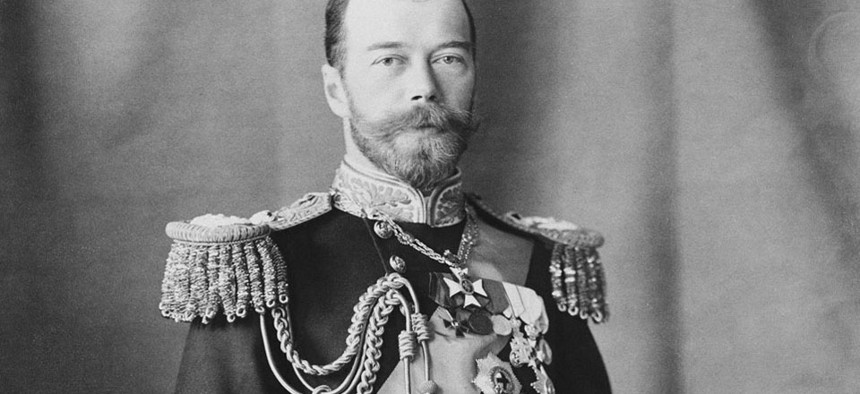
Czar Nicholas II, Emperor of Russia, was the final Russian Czar. UK Royal Collection/Public Domain
Wait, Why Another 'Czar'?
To fight Ebola, President Obama has appointed the U.S.'s latest ... Russian emperor? Here's a brief history of a strange title.
Ron Klain may be the nation's first "Ebola czar," but he certainly won't be the first czar to take power in the United States. American democracy has, over the years, proven quite eager to appoint "czars" (or, if you prefer, "tsars"). Here is a list of America's czars, from the early 20th century to the present. It is, be warned, only partial:
- car czars
- war czars
- weapons czars
- weapons of mass destruction czars
- homeland security czars
- manpower czars
- manufacturing czars
- missile czars
- oil czars
- weatherization czars
- intelligence czars
- foreign aid czars
- AIDS czars
- TARP czars
- patronage czars
- price czars
- poverty czars
- anti-poverty czars
- inflation czars
- anti-inflation czars
- public diplomacy czars
- reading czars
- regulatory czars
- rubber czars
- bioethics czars
- bird flu czars
- Asian Carp czars
- science czars
- shipping czars
- AfPak (Afghanistan and Pakistan) czars
- border czars
- budget czars
- censorship czars
- climate czars
- communication czars
- compensation czars
- consumer czars
- copyright czars
- cyber-security czars (a.k.a. "cyber czars")
- information czars
- domestic policy czars
- domestic violence czars
- drug czars
- energy czars
- ethics czars
- faith-based czars
- trade czars
- transportation czars
- urban affairs czars
- food czars
- food safety czars
- health czars
- health IT czars
- technology czars
- terrorism czars
- Great Lakes czars
Again, that's a partial list. We have a long, weird tradition of czar-iness here in the U.S. So how did the quintessentially Russian term make its way into the workings of 21st-century American democracy? Why are we so czar-happy?
"Czar" comes from a Slavic translation for "Caesar." In Russia—pre-Soviet Russia—the term took on the sense of "Caesar" as "emperor": It suggested not just monarchic rule, but also autocratic rule. Which is why, as used in the United States, it is most commonly associated with offices that deal with national problems that are either systemic or situational, problems that require a kind of sweeping power to be solved: the financial crisis of the early 2000s, the war on drugs, global climate change, and now Ebola.
Its popularity today has been encouraged by the media—the same group who adopted it for American usage. "Czar" was first used, according to this history, in the 1920s, when Woodrow Wilson appointed the financier Bernard Baruch to run his War Industries Board. The press, just a few years after Russia's last czar had been assassinated, reclaimed the title for American purposes: News articles began referring to Baruch's new job as the nation's "industry czar."
The term caught on in 1926 when New York City's Milk Chamber of Commerce—determined, according to The New York Times, to "clean house" and "obtain the favorable opinion of the public"—appointed a "milk czar."
It was Franklin Roosevelt, though, who solidified the trend. The policies he adopted to bring the country out of depression and, after that, into war created a series of new governmental positions, including a "transportation czar," a "manpower czar," a "production czar," a "shipping czar," and—the most business card-friendly of them all—a "synthetic rubber czar." In 1942, The Washington Post remarked on the executive orders that created "new czars to control various aspects of our wartime economy." Even some members of Roosevelt's Cabinet—officials who had been confirmed, as other executive administrators hadn't been, by the Senate—came to be called "czars."
The innovation quickly became tradition—a process sped along by how headline-friendly "czar" proved to be. It also proved press-friendly in a broader sense. The word contains, in its single syllable, multitudes. It is Russian, yes; it is also anti-Soviet. It is foreign, yes; it is also, in its way, American ("Car czar"!). In all that, it is also wonderfully and frustratingly ambiguous: It can convey irony and objectivity at the same time. It can celebrate big government and, also, implicate it.






